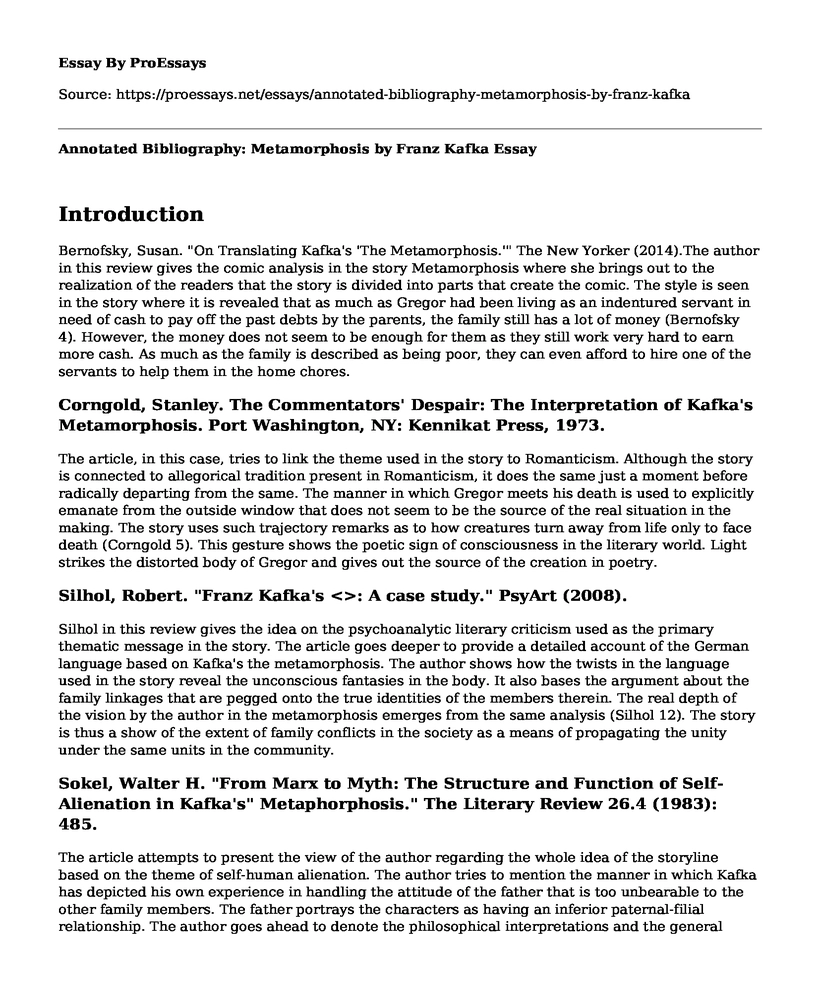Introduction
Bernofsky, Susan. "On Translating Kafka's 'The Metamorphosis.'" The New Yorker (2014).The author in this review gives the comic analysis in the story Metamorphosis where she brings out to the realization of the readers that the story is divided into parts that create the comic. The style is seen in the story where it is revealed that as much as Gregor had been living as an indentured servant in need of cash to pay off the past debts by the parents, the family still has a lot of money (Bernofsky 4). However, the money does not seem to be enough for them as they still work very hard to earn more cash. As much as the family is described as being poor, they can even afford to hire one of the servants to help them in the home chores.
Corngold, Stanley. The Commentators' Despair: The Interpretation of Kafka's Metamorphosis. Port Washington, NY: Kennikat Press, 1973.
The article, in this case, tries to link the theme used in the story to Romanticism. Although the story is connected to allegorical tradition present in Romanticism, it does the same just a moment before radically departing from the same. The manner in which Gregor meets his death is used to explicitly emanate from the outside window that does not seem to be the source of the real situation in the making. The story uses such trajectory remarks as to how creatures turn away from life only to face death (Corngold 5). This gesture shows the poetic sign of consciousness in the literary world. Light strikes the distorted body of Gregor and gives out the source of the creation in poetry.
Silhol, Robert. "Franz Kafka's <>: A case study." PsyArt (2008).
Silhol in this review gives the idea on the psychoanalytic literary criticism used as the primary thematic message in the story. The article goes deeper to provide a detailed account of the German language based on Kafka's the metamorphosis. The author shows how the twists in the language used in the story reveal the unconscious fantasies in the body. It also bases the argument about the family linkages that are pegged onto the true identities of the members therein. The real depth of the vision by the author in the metamorphosis emerges from the same analysis (Silhol 12). The story is thus a show of the extent of family conflicts in the society as a means of propagating the unity under the same units in the community.
Sokel, Walter H. "From Marx to Myth: The Structure and Function of Self-Alienation in Kafka's" Metaphorphosis." The Literary Review 26.4 (1983): 485.
The article attempts to present the view of the author regarding the whole idea of the storyline based on the theme of self-human alienation. The author tries to mention the manner in which Kafka has depicted his own experience in handling the attitude of the father that is too unbearable to the other family members. The father portrays the characters as having an inferior paternal-filial relationship. The author goes ahead to denote the philosophical interpretations and the general structure of the story (Sokel 485). The story thus brings out the aspects of Marxism, Idealism, and Existentialism. The author uses these theories to help in the discussion of the psychoanalytic perceptions of the story.
Sokel, Walter H. "Kafka's" Metamorphosis": Rebellion and Punishment." Monatshefte (1956): 203-214.
Sokel dares to explain the extent of punishment and rebellion taking place in the story. The story on metamorphosis would not have happened in either of the two cases. The case where Gregor would not have nurtured the spirit of hostility toward his boss and his work. It could not have borne fruit he could have revolted without apparent regard to his parents. The process of metamorphosis seems to accommodate the different need by the character to rebel and the ultimate need to suffer under punishment for his rebellion (Sokel 210). The metamorphosis process in the story seems to be unconscious as it protects the character from gaining self-knowledge.
Works Cited
Bernofsky, Susan. "On Translating Kafka's 'The Metamorphosis'." The New Yorker (2014).
Corngold, Stanley. The Commentators' Despair: The Interpretation of Kafka's Metamorphosis. Port Washington, NY: Kennikat Press, 1973.
Silhol, Robert. "Franz Kafka's <>: A case study." PsyArt (2008).
Sokel, Walter H. "From Marx to Myth: The Structure and Function of Self-Alienation in Kafka's" Metaphorphosis"." The Literary Review 26.4 (1983): 485.
Sokel, Walter H. "Kafka's" Metamorphosis": Rebellion and Punishment." Monatshefte (1956): 203-214.
Cite this page
Annotated Bibliography: Metamorphosis by Franz Kafka. (2022, Jul 15). Retrieved from https://proessays.net/essays/annotated-bibliography-metamorphosis-by-franz-kafka
If you are the original author of this essay and no longer wish to have it published on the ProEssays website, please click below to request its removal:
- Coming of Age in Mississippi
- Catherine As Seen by Ellen Dean and Edgar Linton: A Contrastive Analysis
- A Literary Essay Sample: Conflict Between Romanticism and Realism in Jane Austen's Sense and Sensibility
- Irony in Jane Austen's Pride and Prejudice Essay
- Oedipus: The King Who Unknowingly Killed His Father - Essay Sample
- 1984: Exploring Oceania's Totalitarianism & Achievements - Essay Sample
- Essay Example on Discovering Humour & Philosophy in Bill Watterson's 'Calvin & Hobbes' Poem







